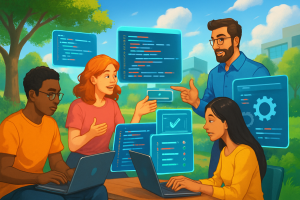Platform engineering has reshaped the way organizations build and deliver software since its emergence in 2015. By assembling and maintaining a suite of development tools, IT system administrators have enabled developers to access everything they need through a unified, self-service portal. This approach streamlines workflows, allowing developers to focus on innovation rather than managing and maintaining their own toolsets.
The Evolution from DevOps to Platform Engineering
While DevOps once dominated the development landscape, its scalability limitations became apparent for organizations with growing teams. Platform engineering addressed these gaps by providing a curated, reliable environment that supports larger development teams more effectively. However, this centralized approach sometimes restricts developers’ autonomy, as the selection of tools is typically controlled by system administrators.
The Emergence of Platform Democracy
A new movement is gaining traction among software professionals: platform democracy. This concept advocates for a more inclusive and flexible approach, where developers and other stakeholders have a voice in shaping the internal platforms they use. Rather than being limited to a set of pre-approved tools, teams can customize and adapt their development environments to better suit their unique needs.
Daniel Bryant, a prominent product marketing leader in the platform engineering space, describes platform democracy as a model where all platform services are exposed to developers for self-service. Importantly, it allows not only developers but also infrastructure, security, and billing teams to contribute and modify the platform, ensuring it meets the diverse requirements of the entire organization.
Moving Beyond Centralization
Platform democracy represents a shift from the centralized control characteristic of traditional platform engineering to a more decentralized, collaborative model. Instead of a rigid, top-down approach, organizations adopting platform democracy encourage input from all relevant teams. This fosters innovation, enhances developer satisfaction, and leads to more robust and adaptable internal platforms.
Colin Humphreys, CEO of a leading platform engineering company, envisions a future where internal platforms operate in “multiplayer mode.” In this scenario, production and consumption of platform capabilities are democratized, enabling seamless collaboration among developers, security teams, site reliability engineers (SREs), and even external service providers.
Real-World Impact: NatWest’s Platform Democracy Journey
NatWest, a major UK-based bank, exemplifies the practical benefits of platform democracy. By leveraging a modern platform engineering solution, NatWest has created a consistent and efficient development environment for its teams. Previously, developers faced significant cognitive load managing their own tools and processes, often resulting in fragmented and inefficient workflows.
With the adoption of platform democracy, a new developer can now set up essential services and deploy applications within their first hour on the job. This rapid onboarding process enables immediate productivity and reduces the time previously spent navigating complex setup procedures.
Chris Plank, an enterprise architect at NatWest, emphasizes that the goal is to centralize certain aspects for efficiency while still allowing developers to contribute to and shape the platform. This balance ensures that the central technology organization is not solely responsible for every aspect of the platform, fostering a sense of shared ownership and collaboration.
The Benefits of Platform Democracy
- Increased Developer Autonomy: Developers have greater influence over the tools and processes they use, leading to higher satisfaction and productivity.
- Enhanced Collaboration: Teams across security, compliance, observability, and billing can all contribute to platform evolution.
- Faster Onboarding: New team members can become productive more quickly, reducing time-to-value.
- Continuous Improvement: Platforms evolve dynamically as more stakeholders participate in their development and maintenance.
- Reduced Bottlenecks: Decentralized contributions prevent central teams from becoming overwhelmed, ensuring smoother operations.
Conclusion
Platform democracy is redefining how organizations approach software development. By decentralizing control and empowering all stakeholders to participate in platform creation and evolution, companies can build more flexible, resilient, and innovative development environments. As this movement continues to gain momentum, businesses that embrace platform democracy are poised to achieve greater agility and success in an increasingly competitive digital landscape.
Read more such articles from our Newsletter here.



